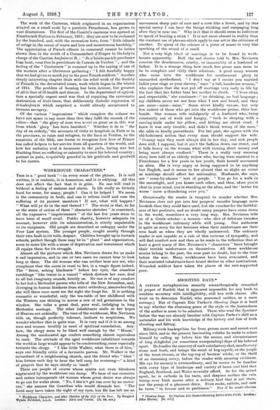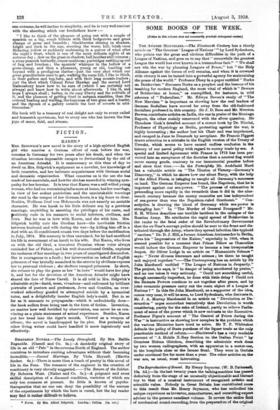SHOOTING DAYS.•
A CERTAIN metaphysician recently misanthropically remarked (a propos of Euclid) that it appeared impossible for any book to combine accuracy with intelligibility, still less with charm. (He went on to denounce Euclid, who possessed neither, as a mere outrage.) But of Captain Eric Parker's Shooting Days it is hard to say whether the charming grace of the style or the learnedness of the author is more to be admired. Those who read the Spectator before the war are already familiar with Captain Parker's skill as a naturalist and his wide knowledge of the history and lore of both shooting and fishing.
Military werk has kepthim far from grouse moor and covert ever since 1914, and in the present fascinating voluthe he seeks to solace himself by calling up before him the scenes and circumstances of long delightful (or sometimes exasperating) days of his beloved sport. He fondles the memory of each satisfactory shot, recalls every stone and bush, and brings the scent of bog-myrtle, or the gurgle of the trout-stream, or the tap-tap of beaters' sticks, or the thrill of an oncoming covey, before the reader with amazing vividness. His eye for scenery is extraordinary, and he seems to be familiar with every type of landscape and variety of beast and bird that England, Scotland, and Wales severally afford. As for the actual sport, he is catholic in his taste, and despises neither the vain tramp over Irish moors after a solitary bird that is not there, nor the pomp of a pheasant drive. Even rooks, rabbits, and rate he turns " to favour and to prettiness." For if ho must choose • Shooting Dave. By Captain Eric Parker (Shooting Milord the Field). London: John Murray. V.e. net.]
one extreme, he will incline to simplicity, and he is very well content with the shooting which our forefathers knew :-
" I like to think of the pleasure of going out with a couple of spaniels on a big, rough hillside with thick hedgerows and great clumps of gorse and bramble ; blackberries shining in clusters, bright and dark in the sun, scenting the warm hill ; birch-trees flickering yellow or suddenly undressing in a quiver of wind after the night's frost, which is one of the most delicate sights of an autumn day ; dew on the grass in shadow, bell heather still crimson ; a stray peacock butterfly, dr/late scabious ; partridges rattling up out of ling and bracken ; the spaniels' whimper in the hollow of a gorse-clump, and then a pheasant, young or old, bustling out beyond with a prodigious olatter—just the very, shot which our great-grandfathers used to get, walking the same hill, I like to think, in their gaiters and top-hats, and with their long muzzle-loaders • just the 1shot which Colonel Peter Hawker and the second Lord llIalmesbury knew how to be sure of (which I am certainly not always) and knew how to write about afterwards. I like It, and hope X always shall ; better, in its easy liberty and the solitude of it, and the pleasure of getting tired in auto= sunshine, than the ordered beating and waiting, the busyness of two guns and a loader, and the rigours of a gallery outside the best of coverts in mid- December."
His book will be a treasury of real delight not only to every exiled and homesick sportsman, but to every one who has known the free joys of moor, field, and stream.



























 Previous page
Previous page